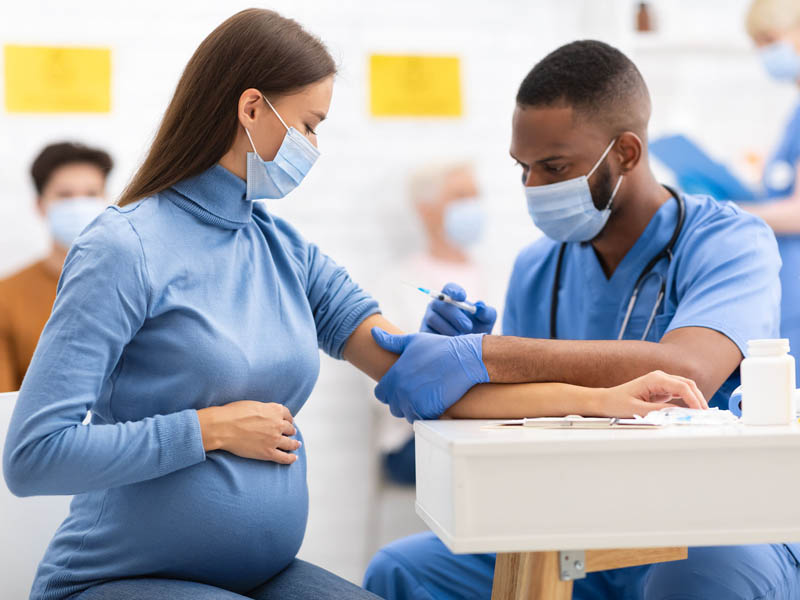Primary Care Is Key to Pandemic Recovery, AAFP Tells Senators
COVID-19 Vaccination a Chance to Narrow Health Disparities
March 24, 2021, 5:45 p.m. News Staff — Health care disparities revealed and widened by the pandemic continue to drive problematic outcome gaps and demand legislative attention, the Academy told a congressional committee this month.

“COVID-19 has highlighted the inefficiencies and inequities that already existed in our health care system,” the Academy said in a March 9 letter to the Health, Education, Labor and Pensions Committee ahead of a hearing that day titled “Examining Our COVID-19 Response: An Update from the Frontlines.”
The letter was addressed to Sens. Patty Murray, D-Wash., and Richard Burr, R-N.C., the chair and ranking member, respectively, of the committee. It was signed by Board Chair Gary LeRoy, M.D., of Dayton, Ohio.
“As the pandemic continues, individuals are struggling more than ever to access the essential primary health care services they need to stay healthy,” the AAFP added. “Family physicians are committed to doing everything possible to prevent and slow the spread of COVID-19 while ensuring that patients get the care they need. However, they can’t do it alone; there are specific actions that the federal government should take now to support access to and coverage for COVID-19 treatment and prevention.”
Nearly 90% of primary care clinicians want their practices to be COVID-19 vaccination sites, but only 22% so far report they have that ability, the Academy said, citing a recent survey.
An AAFP member physician who participated in the March 9 hearing underscored the urgency of this message while pointing to part of the health care system that performs well when adequately supported: federally qualified health centers.
“Although our FQHC accounts for only a small fraction of the hundreds of vaccinating organizations in greater Los Angeles, we routinely account for nearly 10% of the COVID-19 vaccinations given within the county,” Jerry Abraham, M.D., M.P.H., C.M.Q., of Los Angeles, said in written testimony submitted before his appearance.
Story Highlights
Abraham directs the vaccine program at Kedren Community Health Center in South Los Angeles and has been a visible advocate for equitable distribution of the COVID-19 vaccines.
“Across this country, the pandemic has exposed deep-seated divides within our communities,” Abraham said, citing CDC data indicating that Black and Hispanic populations “are dying at twice the rate of other populations.”
“Communities like ours are the ones that have been hit hardest by this pandemic. Residents in the communities around Kedren are far more likely to have been hospitalized or die from COVID-19 than in most other parts of the state. We will continue to be more exposed to risk if we cannot get enough people vaccinated against this deadly disease.”
To maximize vaccination efforts across all populations, speed pandemic recovery and improve overall public health preparedness, the Academy made several high-level recommendations to the committee, including
- equitable COVID-19 vaccine distribution, with Congress acting to support federal, state and local prioritization of doses to primary care practices while enacting policies to reduce disparities in vaccine uptake and overcome vaccine hesitancy;
- extension of Medicare telehealth flexibilities beyond the public health emergency;
- investment in the primary care workforce through the Teaching Health Center Graduate Medical Education program and the National Health Service Corps;
- investment in physicians’ mental health needs via passage of the Dr. Lorna Breen Health Care Provider Protection Act;
- increased production of personal protective equipment and stabilization of the supply chain as called for in the Protect Our Heroes Act of 2020;
- legislation clarifying that public and private payers must fully reimburse COVID-19 testing; and
- an increase of Medicaid payment for primary care services to at least Medicare payment levels.
Kedren, Abraham said, demonstrates what’s possible when state and local health authorities work with primary care practitioners; as of March 5, he testified, the clinic was vaccinating 12,000 people a week. He called on committee members to look to that example and center primary care in the push toward herd immunity while avoiding measures that could disrupt continuity of care or exacerbate inequities.
“While thousands of people have gotten their shots at mass-vaccination clinics like the one at Dodger Stadium in Los Angeles, if we rely only on these mass sites, we will have distorted equitable distribution,” he said. “The technology needed to navigate the state’s vaccine appointment system can be confusing, in particular to older patients. The ability to get to these sites requires the ability to take hours out of your day to be able to sit in line, limiting opportunities for those who have to work or single parents who have to care for their children. And, of course, it requires use of a car … to access a drive-thru mass-vaccination site.”
Instead, Abraham said, it remains essential to build a network of community-based vaccine administrators that involve physicians — a strong asset against the vaccine hesitancy that’s distressingly high “in our Black and immigrant communities.”
“Many people have a personal relationship with their local physician or community clinic,” he said. “If people are in a place they know with a health care professional they trust, they are more likely to be able to talk through their vaccine hesitancy issues. Local physicians and others can help advocate for their patients to be vaccinated and hear their concerns while addressing them with science and compassion.
“We must continue to push for a faster and more equitable vaccine distribution at every turn,” Abraham said.